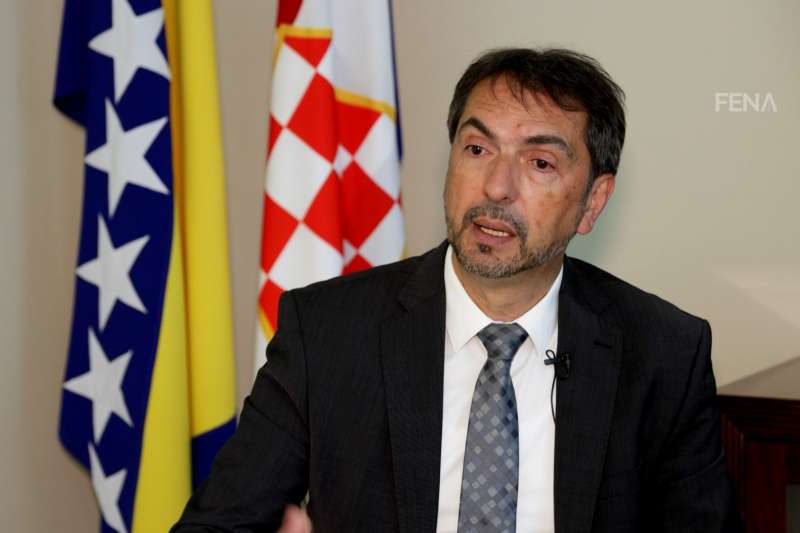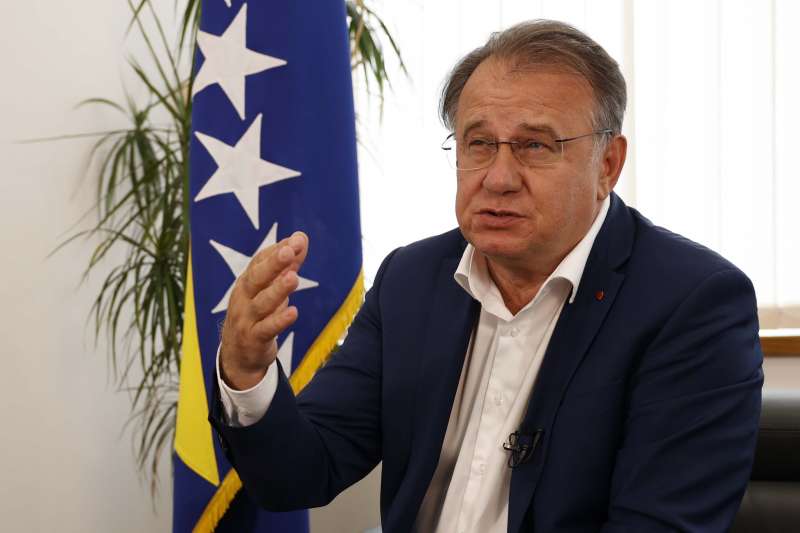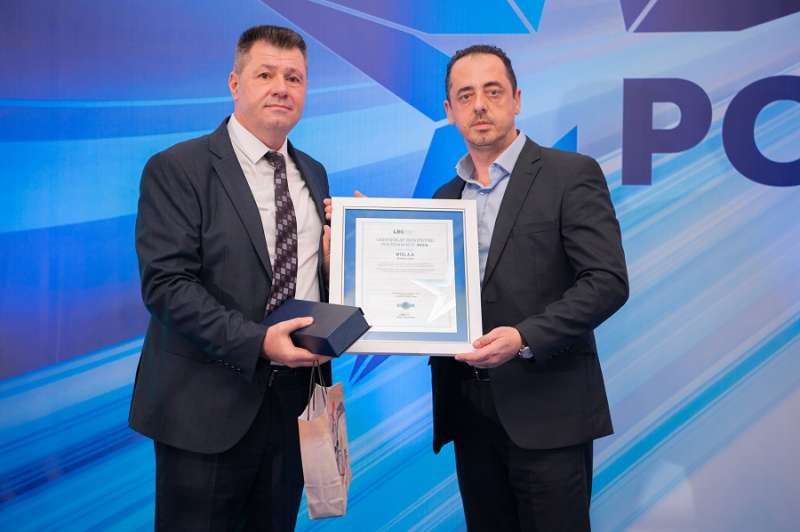SARAJEVO, November 20 (FENA) – Head of the EU Delegation to Bosnia and Herzegovina Lars-Gunnar Wigemark assessed in his interview with FENA and Nezavisne novine that most citizens of BiH are tired of arguments and inability of many politicians to reach an agreement, that they want to see governments and parliaments that are capable of making difficult decisions without endless disputes and delays.
We deliver the interview in its entirety below.
What is your assessment of the situation of the country after the elections?
More than one month has passed since the General Elections were held. The Central Election Commission (CEC) published the official results on 7 November and the allocation of mandates for every level of government is now clear. This is the legal basis for forming governments. I have met with several political leaders, including SDA, HDZ BiH, SDP and DF, to learn more about the coalition talks, but also to pass the message that they should try to form stable governments capable of taking difficult decisions and moving the country closer to the EU. It is for the political parties to decide with whom they would like to form government coalitions while respecting the wishes of the voters.
My own view is that most citizens in this country are tired of the bickering and inability of many politicians to agree and would like to see governments and parliaments that can take difficult decisions without endless debates and delays. The next four years will be very important for BiH. And some people even say that this is the last chance for the political class of BiH to prove itself worthy of their support.
But all governments cannot be formed, as there is a legal vacuum in the Election Law, which is not clear on the distribution of seats in the FBiH House of Peoples.
That is correct. As you know, this was the reason why the EU and US started to facilitate a dialogue between political parties over a year ago to find an agreement to amend the Election Law. However, despite over 40 meetings at working level as well as several meetings with the main political party leaders in the FBiH, it was not possible for the parties involved in these talks to reach a compromise. And, over the summer, it became clear that there was insufficient support in parliament for any of the proposed solutions.
During the EU and US facilitation efforts, Venice Commission experts attending some of the talks with political parties indicated that there are legal grounds for the Central Election Commission to determine the allocation of seats for the FBiH House of Peoples. By the way, everyone who participated in these talks are aware of this. Needless to say, we have continuously underlined that the Central Election Commission should serve as an independent institution responsible for the electoral process and must always act within the existing constitutional and legal framework.
But don’t you think the CEC decision is unconstitutional?
First of all, the CEC has not yet taken a decision. Secondly, any legal challenges to this decision should be addressed to the respective courts in line with the applicable constitutional and legal framework. Whatever the outcome, final decisions are binding and should be implemented.
Would it not be easier to ask the High Representative to step in and use his Bonn Power?
From an EU perspective, BiH needs to demonstrate that it is capable to agree on difficult political issues and move forward on the EU path. This is the essence of a democratic and sovereign country. BiH has applied for EU membership and we are in the middle of the Opinion process, which through the Questionnaire exercise takes the pulse on BiH's readiness to join the EU. Local ownership is essential. The times of imposed solutions by the international community are over.
Some parties feel that the elections were not fair and transparent. What is your opinion?
The EU aligns itself fully with the assessment of the official international election observation conducted by ODIHR, which is based on well-established criteria and methodologies. Many of ODIHR's recommendations on how to improve the electoral process are repeated after each election. The recommendations by ODIHR on how to improve the conduct of elections have to be addressed by the national authorities between the election cycles.
I personally believe that many of these recommendations for how to improve the conduct of elections in BiH should become an important part of the Commission's Opinion and a condition for further EU integration of BiH. Without a sound electoral framework and trust in the outcome of elections, the fabric of democracy will be undermined and BiH cannot meet the conditions for EU membership.
Some media stated that you interfered in the work of the CEC. Did you?
No. The independence of the Central Election Commission is a necessary precondition for a well-functioning electoral system. I have always said that the CEC should act in accordance with its mandate and in line with existing constitutional and legal framework to ensure implementation of the election results, including adhering to prescribed deadlines governing the election process.
In the last few days, media also reported on the Serbian Prime Minister denying genocide in Srebrenica. How do you comment on that?
The European Union rejects any denial, relativisation or misinterpretation of the genocide in Srebrenica.
We call upon all political leaders and others in positions of authority in BiH and the region to lead the way in honouring victims and promoting reconciliation. We all have the responsibility to build a better future for the generations to come, a future based on reconciliation, avoiding divisive actions and rhetoric. Collective respect, recognition and remembrance can help to build a better future for all, fostering reconciliation, regional cooperation and good neighbourly relations.
Any country aspiring to join the EU is expected to comply with and promote EU values of democracy, human rights, tolerance and justice. This includes treating victims of genocide with utmost respect and dignity.
You mentioned the EU Membership Application, where are we with the preparation of the Commission's Opinion?
The Commission will issue its Opinion on BiH's application for membership next year. To prepare it, our colleagues in Brussels and the EU office here in BiH have undertaken a thorough analysis of the state of play of the country in all spheres relevant for EU membership, including on issues pertaining to political and economic criteria, as well as to the country's capacity to take on the obligations deriving from membership. In this process, the country's replies to the Questionnaire represent an important source of information, but it is by no means the only one.
We are still waiting for the replies to the additional questions sent from Brussels to Sarajevo last June. The delay in preparing this last batch of replies does not mean that the EU is just sitting and waiting; it rather sends a sombre signal about the degree of engagement of BiH authorities in the process. It is worrying that, whereas other Western Balkan countries accelerated their steps towards the EU while waiting for their opinions, in BiH there is a slowdown. Some of this is no doubt due to recent elections, but BiH should now deliver without further delay.
What will be included in the Opinion?
The Opinion should answer two important questions: Firstly, to what extent is BiH ready to become an EU Member State and what is the transformation the country needs to undergo to get ready? Secondly, what must the BiH authorities do in order to open accession negotiations, in terms of policy decisions and their implementation? The first question covers all the 35 so-called EU aquis chapters from strict environmental regulations to the internal market for goods, services, capital and people. It involves a comprehensive legal harmonization with all EU standards as well as constitutional issues. The second question focuses on the fundamentals; that is, the political criteria for EU membership and the strengthening of rule of law at all levels of government and across all walks of life.
The Opinion will include recommendations on both accounts, which BiH authorities and the citizens of this country need to take in earnest if they are sincerely interested in pursuing the EU path. EU accession is an existential choice and a strategic goal of this country, which I highly respect. If the new governments at different levels are serious about EU membership, they should carefully consider how they can integrate the Opinion's recommendations into their political programmes for their four-year mandates.
Timewise, it seems that we are far away from the EU Accession?
EU accession takes time, but the process of transformation needed is as important as the end goal of membership itself. Many of the changes to improve the quality of life and rule of law for citizens of this country need to take place before membership is granted to prove BiH can deliver. Other countries in the Western Balkans region are at different stages of this process and it would help BiH to work more closely, for instance, with immediate neighbors like Montenegro and Serbia to see how they are handling the EU integration process and, at the same time, improve regional cooperation with all neighbors. The Copenhagen criteria and adopting EU legislation are major tasks involving all institutions at State, Entity and Cantonal levels. Local governments, including municipalities, also play an important role in the EU integration.
The EU accession process requires an understanding of all institutions, governments and parliaments that it is not a cherry-picking exercise, where you only need to do certain things and can avoid dealing with issues that may be very difficult and involve major - perhaps even painful - changes. Unfortunately, we sometimes notice how authorities at different levels, including many politicians, believe that it is "somehow someone else" and not them who need to take responsibility for the EU integration. And they do not inform themselves enough about what is required to meet EU standards. EU and our Member States are ready to share our own experiences in terms of what is involved and anyone seriously interested in EU integration should be open to such advice.
What about the implementation of the Reform Agenda?
The Reform Agenda was linked to the mandate of the governments elected in 2014 and it expired with the recent 2018 elections. However, this does not mean that everything has been achieved and the transformation should stop. On the contrary, the new governments should be full owners of all changes needed to improve the lives of their citizens. In many ways the Reform Agenda helped to build stronger walls of BiH's economy. Now this house needs to be completed with a roof and other essentials. The EU will offer its full support. Talks among experts and political parties on a new series of socio-economic and rule of law reforms have started and should continue in the coming months. There is a need to agree on concrete and realistic actions and realize them, as soon as new governments and parliaments have been formed. Views of the business community and civil society also need to be considered in any new set of reforms.
(FENA) A. B.










